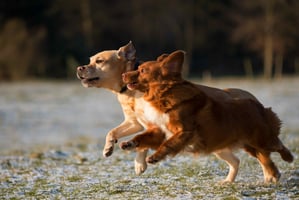Training your 6-month-old puppy can be a challenging but rewarding experience. In this article, we...
7 Week Puppy Training: An Expert Guide
Training your puppy from a young age is essential for their development. This article provides an expert guide to 7 week puppy training, offering practical advice and tips to ensure that your pup gets the best start in life. From understanding their behaviour to potty training and socialising, this article covers all the key points to get your pup up to speed.
Understanding Your Puppy’s Behaviour
At 7 weeks old, your puppy is still a baby, and they will still be learning and developing. As such, it’s important to try and understand their behaviour, as this will help you to form a bond with them and help them to learn.
The most important thing to understand is that puppies are still learning, and they rely on you to teach them the right things. As such, it’s important to be patient, consistent and positive when training them.
It’s also important to remember that puppies tend to have short attention spans, and so it’s important to keep training sessions short and sweet. This will help to ensure that your pup stays focused and engaged.
Potty Training
Potty training is an essential part of 7 week puppy training, and it’s important to start as soon as possible. The key is to be consistent and patient, as this will help your pup to learn quickly.
The best way to potty train is to take your pup outside to the same spot every time they need to go. You should also use a consistent phrase to help them to understand what you want them to do.
It’s also important to reward your pup when they go in the right spot, as this will help to reinforce the behaviour.
Socialising Your Puppy
Socialising your 7 week puppy is essential for their development, as it helps them to build confidence and learn how to interact with other dogs and people.
The best way to socialise your pup is to introduce them to as many different people and dogs as possible. This will help them to build relationships and understand how to interact with others in a positive way.
It’s also important to make sure that your pup is comfortable and relaxed during these interactions. If they seem stressed or anxious, it’s best to take a break and let them relax.
Introducing New Environments
Introducing your pup to new environments is also an important part of 7 week puppy training. This will help them to become more confident and comfortable in different situations.
The best way to do this is to take them to different places, such as parks, beaches and even pet stores. This will help them to become familiar with their surroundings, and it will also give them the opportunity to interact with different people and animals.
It’s also a good idea to keep your pup on a leash during these trips, as this will help to keep them safe and under control.
Teaching Basic Commands
Teaching your pup basic commands is an important part of 7 week puppy training, as it will help them to understand what is expected of them.
The best way to do this is to use positive reinforcement, as this will help to reinforce the behaviour. You should also use a consistent phrase when teaching them the command, as this will help them to understand what you want them to do.
Some of the most important commands to teach your pup are ‘sit’, ‘stay’, ‘come’, ‘down’ and ‘leave it’.
Exercising Your Puppy
Exercising your 7 week puppy is essential for their development, as it will help to keep them healthy and fit. The best way to do this is to take them for regular walks, as this will help to keep them active and give them the opportunity to explore their surroundings.
It’s also important to make sure that your pup is getting enough mental stimulation, as this will help to keep them entertained and engaged. Some great ways to do this include playing games, such as fetch, or doing puzzles and brain games.
Conclusion
7 week puppy training is an essential part of your pup’s development, and it’s important to start as soon as possible. This article has provided an expert guide to 7 week puppy training, offering practical advice and tips to help you get your pup up to speed. From understanding their behaviour to potty training and socialising, this article has covered all the key points to help you get started.



